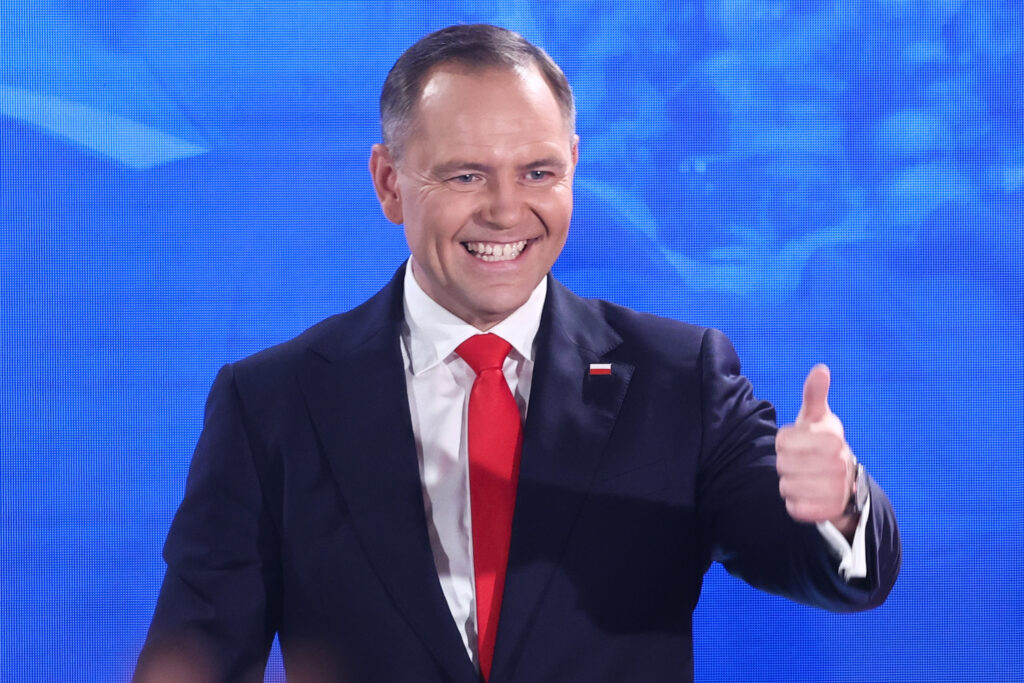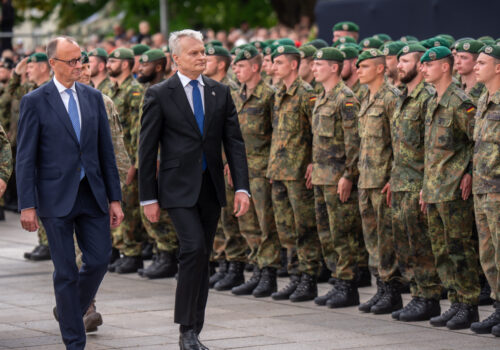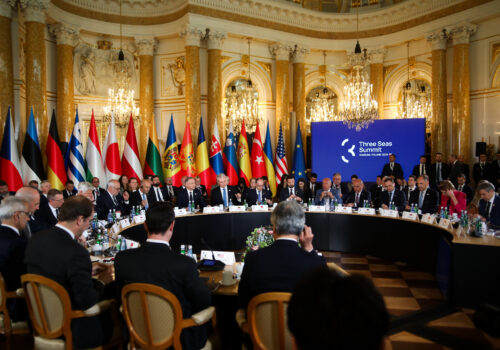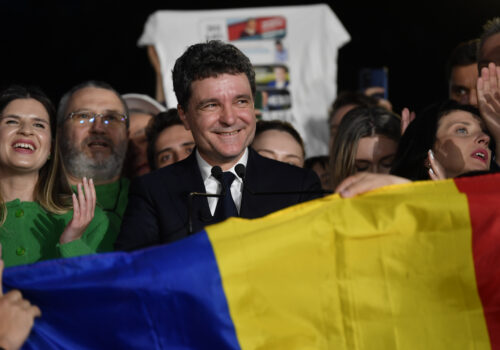The polls have spoken. Karol Nawrocki, a historian and former boxer backed by Poland’s conservative Law and Justice (PiS) party, narrowly triumphed over Warsaw Mayor Rafał Trzaskowski in Sunday’s presidential election. Nawrocki, whose candidacy was embraced by the Trump administration, will be the head of state opposite the centrist, pro-European head of government, Prime Minister Donald Tusk. With war still raging in next-door Ukraine and US-European relations under strain, what should the world expect from Nawrocki? We turned to our Poland experts for answers.
Click to jump to an expert analysis:
Daniel Fried: Nawrocki is well placed to encourage Trump to back Ukraine and European security
Aaron Korewa: Poland’s conservative nationalism is pro-American and pro-NATO
Marek Magierowski: Nawrocki’s politics defy hysterical labels
Danuta Hübner: Will the new president overcome Poland’s polarization?
Mark Scott: Social media was rampant in this election. But how much impact it had is unclear.
Nawrocki is well placed to encourage Trump to back Ukraine and European security
Some initial analysis may depict the Polish presidential election as a fight between democracy and autocracy, or between a pro-Trump and pro-European candidate. This seems exaggerated. The real challenge for Nawrocki will be deciding whether to find common ground with the Tusk government in the face of the threat from Russia and the need to work with the Trump administration on behalf of European and Ukrainian security.
There are substantive grounds for at least some cooperation across partisan lines in Poland to help Ukraine resist Russian aggression and, to this end, to work with key European allies, such as Britain, France, and Germany, as well as with the United States. Unlike the Hungarian nationalist leader Viktor Orbán, Polish nationalists and outgoing President Andrzej Duda generally support Ukraine and resolutely oppose Russian aggression. In early 2022, for example, PiS party leader Jarosław Kaczyński publicly broke with Orbán over the latter’s lack of support for Ukraine at the time. Poland’s current rapid military buildup began during the previous PiS government and continued under the Tusk coalition. Both political camps support NATO and strong relations with the United States.
The Trump administration backed Nawrocki during the election campaign. However unwise US official partisanship during an election might have been, this will give Nawrocki advantages as a perceived ideological ally making the case in Washington for continued US military presence in Poland and US support for NATO and Ukraine. Nawrocki may face challenges working with the European Union (EU), which is still a source of significant funding for Polish development and is trying to support military buildup in Europe, an objective Poles across the political spectrum tend to support. He will also have to contain the anti-German rhetoric common to much of the Polish nationalist right. Poland has had legitimate complaints about German policy toward Russia. But it has won those arguments, as many Germans themselves recognize; Nawrocki would do well to take the win and work with Germany to counter the Russian threat both countries face.
Many Poles were supportive of Ukraine in the initial phases of the full-scale Russian invasion in 2022, providing extensive benefits to Ukrainian refugees and taking hundreds of thousands of them into their homes. While the presence of so many Ukrainian refugees has grown less popular over time, Polish support for Ukraine has remained steady. Still, influential Polish constituencies, such as farmers and some groups concerned with the difficult historical issues between Poles and Ukrainians, have been skeptical about the extent of Polish support for Ukraine. During the campaign, Nawrocki declared that he does not currently support Ukraine’s NATO accession. Now, Nawrocki will have to find a way to balance strategic and political imperatives on support for Ukraine.
As president, Nawrocki will have to balance his campaign rhetoric and partisan interests with broader national interests. He’s hardly the first winning candidate to have to do so.
—Daniel Fried is the Weiser Family distinguished fellow at the Atlantic Council and a former US ambassador to Poland.
Poland’s conservative nationalism is pro-American and pro-NATO
The Poles showed their dissatisfaction with the current government and the political establishment. Nawrocki was an outsider and that paid off. He managed to attract the voters who chose far-right candidates in the first round, while Trzaskowski did not manage to mobilize enough of the voters who supported Tusk’s coalition in October 2023.
For Europe, this could mean that Poland will become more inwardly focused. At the same time, Tusk has previously signaled that he believes beating populism requires addressing some of the issues that drive it. Expect Poland to take a turn for the right on matters such as migration and the European Green Deal.
Nawrocki was the only candidate who visited US President Donald Trump in the White House and received his endorsement. In late May, the Conservative Political Action Conference, known as CPAC, also held a rally in the southeastern town of Rzeszów that featured US Homeland Security Secretary Kristi Noem. Nawrocki’s people made conscious outreach to the US administration. In Poland, the movement that backs Nawrocki is very pro-American and pro-NATO, unlike several other parties in Europe that stand for conservative nationalism. The optimistic scenario is that as president, Nawrocki will establish a connection with Trump that will prevent any plans to withdraw US troops from Poland. At the same time, Tusk’s government will continue forging partnerships with other relevant European states, such as France and the Nordic and Baltic countries.
—Aaron Korewa is the director of the Atlantic Council’s Warsaw Office which is part of the Europe Center.
Nawrocki’s politics defy hysterical labels
First and foremost, branding Nawrocki as “populist,” “hard-core Euroskeptic,” “far right,” “pro-Putin,” or “Trumpian” is preposterous. Polish politics is too complex to indulge in such simplistic terms.
Poland’s president-elect is probably as “pro-Kremlin” as his entire political camp, which, while in power, provided Ukraine with hundreds of tanks, aircraft, howitzers, and communication gear, while pressuring all European partners to ramp up sanctions against Russia.
Nawrocki is also as “Euroskeptic” as German Chancellor Friedrich Merz, given the attitude of both politicians toward migration policies and EU climate regulations. And he is as “Trumpian” as his Finnish soon-to-be counterpart Alexander Stubb, who charmingly played a spot of golf with the US president a few weeks ago.
Nawrocki is doubtless a staunch conservative who adroitly capitalized on the nature of wide swaths of the Polish electorate, which, contrary to European trends, has remained—politically, socially, and emotionally—attached to the notion of freedom, sovereignty, tradition, and Christian values. The PiS-backed candidate has also largely banked on the rising unpopularity of Tusk’s government, especially among young voters (Nawrocki won the eighteen-to-twenty-nine-year-old cohort).
Another major factor in Nawrocki’s win was the aristocratic style and aloofness of his rival, Trzaskowski, who was unable to connect with the working class and Poland’s rural constituency. This stood in contrast to Nawrocki, the former boxer and son of a toolmaker and a bookbinder.
—Marek Magierowski is a nonresident senior fellow with the Atlantic Council’s Europe Center and the director of strategy for the Poland program at the Freedom Institute in Warsaw. He previously served as Poland’s ambassador to the United States and to Israel.
Will the new president overcome Poland’s polarization?
Poles know that their vote can change the course of the history of their country. And they have known from day one of this presidential campaign that this election matters deeply for our future. However, as, sadly, the campaign was about preventing the other side from coming to power, it is an open question whether the president we have just elected will understand what is good for Poles in these times of uncertainty.
Will our new president spare no effort to overcome the deep polarization of the Polish people? A polarized society is easy to manipulate and an easy target for Russian disinformation. This is the biggest challenge for the new president—understanding the importance of building bridges between Poles. It is an extremely difficult task, especially in times when many political careers have been built for decades on societal divisions. And I worry that this president-elect comes from a political tradition with little propensity to seek compromise. The presidency is an important part of the Polish system of checks and balances, and the new president will need to support the government in building a democratic Poland where everyone can live.
Poles need a president who will understand that isolation has never done Poland any good, that the European Union is our place, and that it is crucial that Poland takes its share of responsibility for Europe. Will the new president support European efforts to build its defense capabilities and its security-based economic competitiveness? Will he work for peace on our continent?
In addition, my hope is that the new president will work to keep the United States and Europe together. They need each other.
—Danuta Hübner is a distinguished fellow with the Atlantic Council’s Europe Center. She was Poland’s first-ever European commissioner, responsible first for trade, then with regional policy. She also established and oversaw the institutional structure to deliver Poland’s accession to the EU.
Social media was rampant in this election. But what impact did it have?
The narrow victory for Nawrocki in Poland’s presidential election is the latest example of why it’s hard to directly link any country’s electoral outcome with how voters engage with candidates, political operatives, and others across social media. There was a significant amount of hyper-partisan attacks across social media, from both sides, ahead of Sunday’s vote in the Central European country. There was also evidence—including via research from the Atlantic Council—that foreign governments attempted to sway voter outcomes.
But how successful these efforts were, as well as the ongoing interventions from social media companies to possibly reduce such content’s impact, are almost impossible to quantify. Given the tightly run race, small shifts in voters’ behavior—potentially spurred on by what people may have seen in their online feeds—could have played a role. But, at this stage, that is more a theory than confirmed reality.
The most recent Polish presidential election joins a growing list of both European and non-European elections in which social media and its impact on how people voted remain a black box. As much as EU policymakers have centered their attention on how the likes of TikTok and YouTube may have amplified anti-EU voices ahead of national elections, there has been a growing offline shift in public opinion across the bloc away from greater EU alignment that has nothing to do with the digital world.
At best, this weekend’s vote is another example of how, in the middle of 2025, these digital platforms are now part of every country’s election cycle. But social media’s impact on such a closely fought election is mostly unknown.
—Mark Scott is a senior resident fellow at the Digital Forensic Research Lab’s (DFRLab) Democracy + Tech Initiative within the Atlantic Council Technology Programs.
Further reading
Fri, May 30, 2025
How NATO’s eastern flank is setting the standard for collective defense
New Atlanticist By Justina Budginaite-Froehly
NATO's eastern flank countries have shown that regional coordination can transform vulnerabilities into strategic assets that enhance deterrence and operational readiness.
Thu, May 22, 2025
The case for a Three Seas Defense Innovation Hub
New Atlanticist By Justina Budginaite-Froehly
Because of increasing threats to critical energy, transport, and digital infrastructure, the Three Seas Initiative should add defense innovation as another pillar of its mission.
Mon, May 19, 2025
Experts react: What message did Romanians send by electing Nicusor Dan?
New Atlanticist By
The mathematician and mayor of Bucharest came out ahead of his right-wing rival on May 18. Atlantic Council experts sum up the election results and the implications.
Image: Law and Justice party supported candidate for the President of Poland Karol Nawrocki during the election evening after the seond round of presidential election in Warsaw, Poland on June 1, 2025. (Photo by Jakub Porzycki/NurPhoto)NO USE FRANCE




